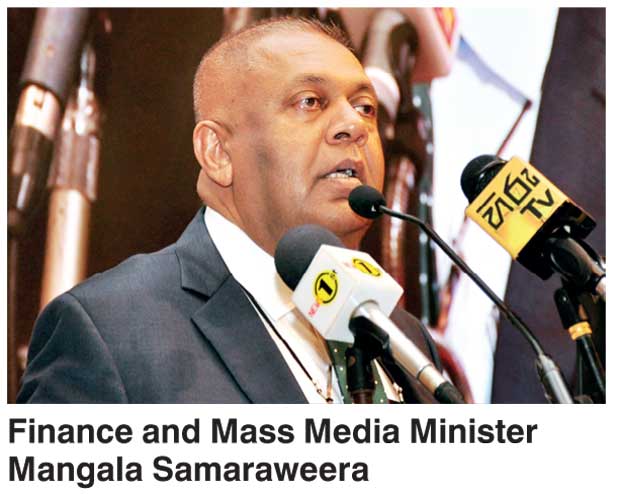Friday Feb 27, 2026
Friday Feb 27, 2026
Saturday, 11 November 2017 00:50 - - {{hitsCtrl.values.hits}}

By Ashwin Hemmathagama
– Our Lobby Correspondent
Finance Minister Mangala Samaraweera yesterday offered greater clarity on several of the contentious proposals of Budget 2018, justifying their inclusion as necessary for a progressive nation.
Speaking to the media for the first time since Thursday’s budget presentation, the Minister was emphatic on the benefits of the proposed tax for debt repayment, identified as the “Medamulana Tax,” that seeks to charge 20 cents per Rs. 1, 000 worth of bank transactions.
“The banks are not supposed to recover this tax from the customer, but will have to pay for it on their own with effect from 1 of April 2018. The banks will get an income tax waiver in return. The massive debt burden the Rajapaksa regime left behind cannot be shouldered alone without some support. You are well aware of massive debt repayments due in the next two years. The country’s debt was no difference to the Meethotamulla garbage mount when we took office in 2015. Despite that we have undertaken a lot of development activities in the country,” said Samaraweera.
Moving on to the duty revisions on liquor, the Minister said that the price hike will be based on alcohol percentage hoping that it would discourage people from resorting to stronger drinks. “Globally, the trend is that people are moving away from hard liquor and resort to mush mild drinks such as beer and wines. But here we have the moonshine menace amounting to over 49% of the market share overtaking legalised alcohol. In Sri Lanka, only 13% of alcohol users consume soft liquor, while 84% are consuming hard liquor. Therefore, we should rescue the public - especially our youth - from moonshine,” he said.
Clarifying rumours that beer will be allowed in all shops, Minister Samaraweera said: “Some have expressed fears that after introducing this procedure, everyone will sell liquor even at their homes and roadside shops. No;thatwill not be allowed. If a guest house owner wants to get a license, he will have to register with the Divisional Secretariat in the area. He should also produce a tax file. Nobody will be able to sell liquor without obtaining a license,” he added.
With respect to environmental protection and discouraging the use of hydrocarbonfuels, the Minister said that the Carbon Tax will make the much-needed change without becoming a big burden on the ordinary citizens who would use newer models rather than hanging on to decades-old models. “For motorcycles, three-wheelers, Maruti cars and Prado jeeps not older than five years, the carbon tax will be 17 cents, 27 cents, one rupee and Rs.4.10 per day respectively.
If they are older than 10 years, the tax will be 51 cents per day for motorcycles, 82 cents per day for three wheels and Rs.3.25 per day for Maruti cars,” the Minister explained. However, responding to a question, the Minister stated that the Government had to follow a simple mechanism in the application of the Carbon Tax proposed to calculate, based on the engine capacity rather than the amount of carbon seen on emission or quantity of fuel consumed.
“Young talent is wasted on three-wheelers. We will offer these three-wheel drivers free training by the Tourism Authority and those who complete it will receive a sticker stating, ‘Tourist Board approved tuk-tuks’ and even giving a special colour to them is being considered,” he added.
Addressing the benefits of the motor vehicles excise duty and luxury tax revisions, the Minister encouraged the public to start moving to hybrid or electric vehicles. “The pervious formula on vehicle import was complex. We have made it simple in this budget. Now [the public] is encouraged to go for hybrid or electric vehicles. We have also provided for the establishment of 64 charging centres around the country with the help of the private sector. Solar power generation is another area which will come in handy for off-grid vehicle charging,” he said.
The myth that all mobile calls are now subjected to a tax of Rs.2/- per minutes also came up.
State Minister of Finance Eran Wickramaratne said that the telco operators are to bear the costs rather passing it to their respective consumers. “This tax of Rs.2/- is based on the telco transmission towers. We are looking at reducing the number of towers,” he said opening the possibility to use the transmission towers commonly among the telcos.